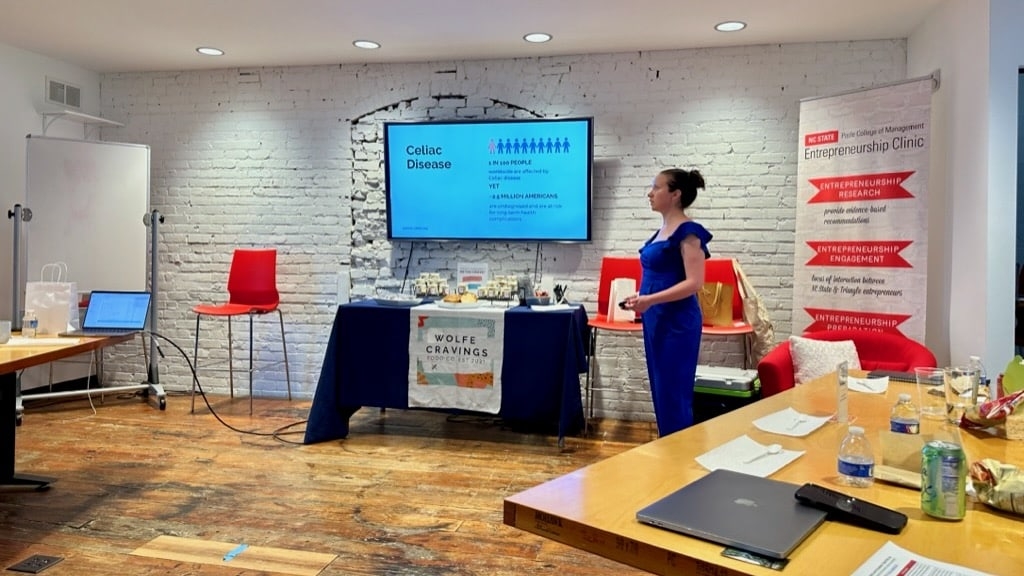By Jess Clarke
If you need financial and mentoring resources to launch a business idea, where do you find them?
Jenkins MBA student Hunter Brown didn’t have to look far. He pursued Poole College’s Technology Entrepreneurship Commercialization (TEC) certificate, a program that propelled him to success in NC State University’s annual eGames competition this spring.
The result? His team won $5,000 — and ongoing guidance from seasoned businesspeople — to bring their product to market.
“The TEC course is real life. You pick intellectual property that’s sitting on the shelf at NC State and try to commercialize it. We partnered with mentors,” Brown says. “It’s the most practical class I’ve been a part of at NC State.”
To develop WOLFSPIDER, an innovative crop disease management system, Brown’s TEC team combined patented genetic testing with a robotic device, invented by NC State professors Lina Quesada and Lirong Xiang respectively. After a video pitch and then a live pitch for the university-wide eGames on campus in April, the team snagged its prize.

Through the TEC curriculum, Brown used evidence-based decision-making to refine his idea and develop a solid value proposition to support commercial viability.
“TEC provides a quantitative framework for how to make a product more successful…There’s a flow for how you bring things to market. Critical-thinking skills are what I’ll take away from TEC,” says Brown, a scientist with the NC State Biomanufacturing Training and Education Center (BTEC).
With its entrepreneurial ecosystem, TEC has a history of preparing students to excel at the eGames. This year, current and former TEC students fielded four teams, which won a total of $20,000 of the $50,000 awarded in the competition.
The eGames are “a great opportunity for students to demonstrate their ability to articulate their vision for a problem and who they’re solving the problem for…so they can get funding to move their venture forward,” TEC Director Lisa Chang says.
TEC’s volunteer executives-in-residence, mentoring business leaders, also help students move their ventures forward. “The amount of nurturing that’s done with students is critical,” Chang says. “Mentors are crucial in the constant shaping of ideas.”
Shaping ideas through TEC helped MBA student Malhar Shah bring a novel business to the eGames, where he won $3,000 for microWatt Energy, a rooftop solar energy system for apartments. He’s founder and CEO of the Raleigh-based LLC.

“Going through the process of taking something so raw and figuring out what’s the market for this product, going through the business analysis, I found that to be very valuable,” says Shah, a John Deere assistant program manager. “Eventually you have a shoot-for-the-moon goal. You have to start somewhere, and that’s what the TEC program helped me put together.”
Shah is in a peer support network of fellow eGames winners with diverse business plans. “When you’re a new company, it’s always valuable to hear what other new companies are doing because we’re at a similar stage,” he says.
The cross-disciplinary aspect of the eGames competitions is an important dynamic with the events.
“Entrepreneurship is highly interdisciplinary,” Brown says. “You bring in different partners who can do different things. Having this free flow of ideas is how you ultimately commercialize something … Making sure students see how interconnected everything is, is a great way to foster innovation.”
TEC and NC State alumni overall have had a leading role in fostering innovation in entrepreneurship off campus.
TEC alumni, through startups and other business activity, have generated more than $750 million in capital and employed more than 500 people regionally over the years, Chang notes. “The bottom line is that small businesses fuel the American economy, and we’re certainly part of that locally and nationwide,” she says.
Most TEC alumni, instead of starting a business, excel at adding value at their current company.
“They use skills they learned in the TEC program to do opportunity analysis and innovation management in their own organizations. They’re finding good, high-paying jobs. We have a big impact in that area,” TEC technology professor Steve Barr says.
Brown uses skills he’s gained from the MBA and TEC programs to add value in his BTEC work developing biomanufacturing training courses.
“That’s definitely enhancing how I convey materials to industry professionals,” he says. The eGames offered “a different way of marketing science…where you’re trying to make this highly technical field accessible to everyone to get people excited about it.”
The ultimate goal with WOLFSPIDER is to develop real-time genetic testing in the field to meet the need for more sustainable and cheaper management of crop diseases like downy mildew. Brown believes his team has found a solution, with NC State’s help.
“There’s so much on campus to support innovative research, departments that really want researchers to commercialize their technology,” Brown says. “If you have a cool idea and the energy to bring it to market, they’re there to support you.”



